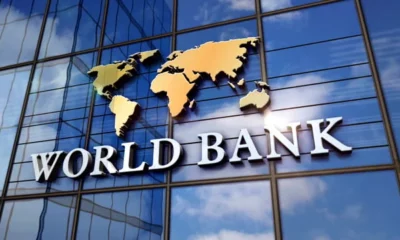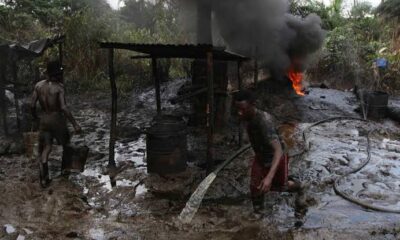Strictly Personal
Animals, Mr. Minister? This kind of language caused Holocaust, By Jenerali Ulimwengu
Published
6 months agoon

Israeli Defence Minister Yoav Gallant: “We are fighting human animals”. “Human animals” might be referring to the fact that biologically we are all animals, being part of the mammalian subgroup, the warm-blooded quadruped species, as set aside from the reptiles, fishes and birds.
But it would be a waste of time for a busy minister in a war situation to be delivering a lecture on basic biology instead of mobilising soldiers and collecting materiel to send to Gaza to pulverise that hapless enclave, which has known no peace over a decade and half of the Israeli blockade.
Rather, what the minister was doing with that statement was undergoing a Freudian slip that put Adolf Hitler’s words in his mouth, words primarily used by the Nazis to characterise… Jews.
“Animals” in this case was popular with the Nazis, who used it to dehumanise Jews, relegating them to the level of sub-humans, in some cases equating them to disease-carrying rodents which should be got rid of by extermination.
When I watched the minister as he said these words I went back to an article by Michelle Wiebe, a student at the University of Ontario, titled Extermination and Euthanasia: Animal Symbolism in Nazi Germany.
To be fair to Adolf Hitler, he did not invent antisemitism; it existed for centuries before the Nazis arrived on the scene – the Jews as slayers of Jesus was an emotive thought since Calvary, and the stigma followed Jewishness throughout the Middle Ages.
In the same era, Wielbe writes, there were records of Frenchmen or women being accused of bestiality and burned alive because they had had sexual liaison with a Jew — considered beasts. Such dehumanisation was rampant in many Christian nations, and pogroms were commonplace everywhere in medieval Europe.
So, the Nazis only found a most useful tool to wield in their quest for world conquest, and they used it to devastating effect, the Jews paying the heaviest price.
That a defender of the state of Israel, a Jewish state, should be caught on tape using Hitler’s language is truly incredible.
And yet that is the logic of oppression and inhumanity. Those who seek justification for the unjust acts have a serious penury of words with which to explain to their constituencies what they intend to do to solve whatever they see as their problem.
For the Nazis and Hitler, it was important to convince the German populace — already with heavy doses of antisemitism — that the Jews were at the core of all the decline, suffering and destruction of the German people; they had to be exterminated.
Wiebe compares this with the justification for the African slave trade and the horrible tribulations suffered by Africans during the so-called Middle Passage.
Those involved in this commerce had to justify those crimes by equating their Black cargo to simians, apes, which could not be fully human and were therefore good material for forced labour. Even the popes of the time blessed this abomination.
The belief that Black slaves were some kind of higher order of primates made it easy for the crews of the seagoing vessels to sardine-pack rows upon rows of Africans in hellholes beneath the decks, where innumerable Africans died of disease or starvation or were jettisoned into the ocean waves when rations went dangerously low.
So, the minister’s statement forms part of the discourse of genocide perpetrators throughout history. In the Rwanda genocide of 1994 such narratives were weaponised and put at the service of the mass murderers, such as calling Tutsis cockroaches.
It is this type of madness that seems to have entered the Israeli minister of Defence, who may have forgotten that these are Hitler’s words that should be associated with the Holocaust. The denial of all means of livelihood — no food, no water, no power, no fuel — as announced by the same minister, could lead to mass murder.
For all that, the United States and Western governments have given Israel a carte blanche to do pretty much as it pleases, which means Gaza is cooked. Hardly a week has gone by since the pounding of this enclave started and it is already a moonscape; it is frightening to imagine what it will look like in another week.
The glib talk about rules of war and respect for civilian welfare rings hollow when one considers that, over the years during which Israel has occupied the West Bank and imprisoned the Gaza Strip, there is very little respect paid to civilian life in way, shape or form.
The pictures we are accustomed to watching are of heavily armed Israeli soldiers firing at children armed with catapults and stones. During this phase we are likely to see some more of these disconcerting scenarios, with America supplying the arms.
I have been listening to the various declarations from Western governments siding with Israel unreservedly, and they all forgot — rather conveniently — to mention the real casus belli of all the series of flare-ups since 1948.
Ulimwengu is now on YouTube via jeneralionline tv. E-mail: jenerali@gmail.com
You may like
-


Air Peace, capitalism and national interest, By Dakuku Peterside
-


This is chaos, not governance, and we must stop it, By Tee Ngugi
-


Off we go again with public shows, humbug and clowning, By Jenerali Uliwengu
-


How patriarchy underpins gender violence today, By Tee Ngugi
-


Help! There’s a dangerous, secret plot to save the EAC from imminent death, By Charles Onyango-Obbo
-


South African women of Jewish descent stage protest against Hamas
Strictly Personal
Air Peace, capitalism and national interest, By Dakuku Peterside
Published
2 weeks agoon
April 16, 2024
Nigerian corporate influence and that of the West continue to collide. The rationale is straightforward: whereas corporate activity in Europe and America is part of their larger local and foreign policy engagement, privately owned enterprises in Nigeria or commercial interests are not part of Nigeria’s foreign policy ecosystem, neither is there a strong culture of government support for privately owned enterprises’ expansion locally and internationally.
The relationship between Nigerian businesses and foreign policy is important to the national interest. When backing domestic Nigerian companies to compete on a worldwide scale, the government should see it as a lever to drive foreign policy, and national strategic interest, promote trade, enhance national security considerations, and minimize distortion in the domestic market as the foreign airlines were doing, boost GDP, create employment opportunities, and optimize corporate returns for the firms.
Admitted nations do not always interfere directly in their companies’ business and commercial dealings, and there are always exceptions. I can cite two areas of exception: military sales by companies because of their strategic implications and are, therefore, part of foreign and diplomatic policy and processes. The second is where the products or routes of a company have implications for foreign policy. Air Peace falls into the second category in the Lagos – London route.
Two events demonstrate an emerging trend that, if not checked, will disincentivize Nigerian firms from competing in the global marketplace. There are other notable examples, but I am using these two examples because they are very recent and ongoing, and they are typological representations of the need for Nigerian government backing and support for local companies that are playing in a very competitive international market dominated by big foreign companies whose governments are using all forms of foreign policies and diplomacy to support and sustain.
The first is Air Peace. It is the only Nigerian-owned aviation company playing globally and checkmating the dominance of foreign airlines. The most recent advance is the commencement of flights on the Lagos – London route. In Nigeria, foreign airlines are well-established and accustomed to a lack of rivalry, yet a free-market economy depends on the existence of competition. Nigeria has significantly larger airline profits per passenger than other comparable African nations. Insufficient competition has resulted in high ticket costs and poor service quality. It is precisely this jinx that Air Peace is attempting to break.
On March 30, 2024, Air Peace reciprocated the lopsided Bilateral Air Service Agreement, BASA, between Nigeria and the United Kingdom when the local airline began direct flight operations from Lagos to Gatwick Airport in London. This elicited several reactions from foreign airlines backed by their various sovereigns because of their strategic interest. A critical response is the commencement of a price war. Before the Air Peace entry, the price of international flight tickets on the Lagos-London route had soared to as much as N3.5 million for the economy ticket. However, after Air Peace introduced a return economy class ticket priced at N1.2 million, foreign carriers like British Airways, Virgin Atlantic, and Qatar Airways reduced their fares significantly to remain competitive.
In a price war, there is little the government can do. In an open-market competitive situation such as this, our government must not act in a manner that suggests it is antagonistic to foreign players and competitors. There must be an appearance of a level playing field. However, government owes Air Peace protection against foreign competitors backed by their home governments. This is in the overall interest of the Nigerian consumer of goods and services. Competition history in the airspace works where the Consumer Protection Authority in the host country is active. This is almost absent in Nigeria and it is a reason why foreign airlines have been arbitrary in pricing their tickets. Nigerian consumers are often at the mercy of these foreign firms who lack any vista of patriotism and are more inclined to protect the national interest of their governments and countries.
It would not be too much to expect Nigerian companies playing globally to benefit from the protection of the Nigerian government to limit influence peddling by foreign-owned companies. The success of Air Peace should enable a more competitive and sustainable market, allowing domestic players to grow their network and propel Nigeria to the forefront of international aviation.
The second is Proforce, a Nigerian-owned military hardware manufacturing firm active in Rwanda, Chad, Mali, Ghana, Niger, Burkina Faso, and South Sudan. Despite the growing capacity of Proforce in military hardware manufacturing, Nigeria entered two lopsided arrangements with two UAE firms to supply military equipment worth billions of dollars , respectively. Both deals are backed by the UAE government but executed by UAE firms.
These deals on a more extensive web are not unconnected with UAE’s national strategic interest. In pursuit of its strategic national interest, India is pushing Indian firms to supply military equipment to Nigeria. The Nigerian defence equipment market has seen weaker indigenous competitors driven out due to the combination of local manufacturers’ lack of competitive capacity and government patronage of Asian, European, and US firms in the defence equipment manufacturing sector. This is a misnomer and needs to be corrected.
Not only should our government be the primary customer of this firm if its products meet international standards, but it should also support and protect it from the harsh competitive realities of a challenging but strategic market directly linked to our national military procurement ecosystem. The ability to produce military hardware locally is significant to our defence strategy.
This firm and similar companies playing in this strategic defence area must be considered strategic and have a considerable place in Nigeria’s foreign policy calculations. Protecting Nigeria’s interests is the primary reason for our engagement in global diplomacy. The government must deliberately balance national interest with capacity and competence in military hardware purchases. It will not be too much to ask these foreign firms to partner with local companies so we can embed the technology transfer advantages.
Our government must create an environment that enables our local companies to compete globally and ply their trades in various countries. It should be part of the government’s overall economic, strategic growth agenda to identify areas or sectors in which Nigerian companies have a competitive advantage, especially in the sub-region and across Africa and support the companies in these sectors to advance and grow to dominate in the African region with a view to competing globally. Government support in the form of incentives such as competitive grants ,tax credit for consumers ,low-interest capital, patronage, G2G business, operational support, and diplomatic lobbying, amongst others, will alter the competitive landscape. Governments and key government agencies in the west retain the services of lobbying firms in pursuit of its strategic interest.
Nigerian firms’ competitiveness on a global scale can only be enhanced by the support of the Nigerian government. Foreign policy interests should be a key driver of Nigerian trade agreements. How does the Nigerian government support private companies to grow and compete globally? Is it intentionally mapping out growth areas and creating opportunities for Nigerian firms to maximize their potential? Is the government at the domestic level removing bottlenecks and impediments to private company growth, allowing a level playing field for these companies to compete with international companies?
Why is the government patronising foreign firms against local firms if their products are of similar value? Why are Nigerian consumers left to the hands of international companies in some sectors without the government actively supporting the growth of local firms to compete in those sectors? These questions merit honest answers. Nigerian national interest must be the driving factor for our foreign policies, which must cover the private sector, just as is the case with most developed countries. The new global capitalism is not a product of accident or chance; the government has choreographed and shaped it by using foreign policies to support and protect local firms competing globally. Nigeria must learn to do the same to build a strong economy with more jobs.
Strictly Personal
This is chaos, not governance, and we must stop it, By Tee Ngugi
Published
3 weeks agoon
April 10, 2024
The following are stories that have dominated mainstream media in recent times. Fake fertiliser and attempts by powerful politicians to kill the story. A nation of bribes, government ministries and corporations where the vice is so routine that it has the semblance of policy. Irregular spending of billions in Nairobi County.
Billions are spent in all countries on domestic and foreign travel. Grabbing of land belonging to state corporations, was a scam reminiscent of the Kanu era when even public toilets would be grabbed. Crisis in the health and education sectors.
Tribalism in hiring for state jobs. Return of construction in riparian lands and natural waterways. Relocation of major businesses because of high cost of power and heavy taxation. A tax regime that is so punitive, it squeezes life out of small businesses. Etc, ad nauseam.
To be fair, these stories of thievery, mismanagement, negligence, incompetence and greed have been present in all administrations since independence.
However, instead of the cynically-named “mama mboga” government reversing this gradual slide towards state failure, it is fuelling it.
Alternately, it’s campaigning for 2027 or gallivanting all over the world, evoking the legend of Emperor Nero playing the violin as Rome burned.
A government is run based on strict adherence to policies and laws. It appoints the most competent personnel, irrespective of tribe, to run efficient departments which have clear-cut goals.
It aligns education to its national vision. Its strategies to achieve food security should be driven by the best brains and guided by innovative policies. It enacts policies that attract investment and incentivize building of businesses. It treats any kind of thievery or negligence as sabotage.
Government is not a political party. Government officials should have nothing to do with political party matters. They should be so engaged in their government duties that they literally would not have time for party issues. Government jobs should not be used to reward girlfriends and cronies.
Government is exhausting work undertaken because of a passion to transform lives, not for the trappings of power. Government is not endless campaigning to win the next election. To his credit, Mwai Kibaki left party matters alone until he had to run for re-election.
We have corrupted the meaning of government. We have parliamentarians beholden to their tribes, not to ideas.
We have incompetent and corrupt judges. We have a civil service where you bribe to be served. Police take bribes to allow death traps on our roads. We have urban planners who plan nothing except how to line their pockets. We have regulatory agencies that regulate nothing, including the intake of their fat stomachs.
We have advisers who advise on which tenders should go to whom. There is no central organising ethos at the heart of government. There is no sense of national purpose. We have flurries of national activities, policies, legislation, appointments which don’t lead to meaningful growth. We just run on the same spot.
Tee Ngugi is a Nairobi-based political commentator
EDITOR’S PICK


Al Ahly, Esperance to clash in CAF Champions League final
Two of Africa’s club giants, Egypt’s Al Ahly and Esperance of Tunisia, will do battle next month over two legs...


Collabo with Burna Boy enabled me buy house for my mum— Mozambican DJ Tarico
Mozambican disc jockey and sound-producer, DJ Tarico, has credited Nigeria’s Afrobeats sensation, Burna Boy, with his sudden wealth which enabled...


RepAir, Cella partner to launch carbon capture in Kenya
Global Direct Air Capture (DAC) firm, RepAir, has entered into a partnership with carbon storage technology company, Cella, to launch...


Mapanza traditional council shares positive outlook on media rights, freedom of expression
Jonathan Muchindu, a representative of the Traditional Council of Mapanza Chiefdom in Choma District, Southern Province, Zambia, asserts that the...


World Bank grants Malawi $57.6 million for food crisis
As a response to its food crisis, the World Bank said on Friday that it would give Malawi $57.6 million...


Nigeria loses N1.29trn annually to crude oil theft, vandalism— Reps Speaker
Speaker of Nigeria’s House of Representatives, Hon. Abbas Tajudeen, has revealed that the country loses a whopping sum of N1.29...


Intel Liftoff Hackathon 2024 calls for applications from African AI startups
Applications for the 2024 cohort of Intel Liftoff Hackathon has opened for African AI startups designed to bring together aspiring...


African men run away from single mothers— Joselyn Dumas
Veteran Ghanaian actress and media personality, Joselyn Dumas, has lamented the fact that most African men shy away from getting...


Former Zambian captain Rainford Kalaba discharged from hospital after near-fatal accident
Former Zambian national team captain, Rainford Kalaba, has been discharged from hospital weeks after he was involved in a near-fatal...


‘Cyber Act fails to protect the vulnerable,’ Student demands media inclusivity for persons with disabilities
Peter Libila, a student at Icof University’s Chipata campus, highlights the lack of awareness among individuals with disabilities and those...
Trending
-

 Sports2 days ago
Sports2 days agoFormer Zambian captain Rainford Kalaba discharged from hospital after near-fatal accident
-

 Metro2 days ago
Metro2 days ago‘Cyber Act fails to protect the vulnerable,’ Student demands media inclusivity for persons with disabilities
-

 Tech2 days ago
Tech2 days agoIntel Liftoff Hackathon 2024 calls for applications from African AI startups
-

 Tech16 hours ago
Tech16 hours agoRepAir, Cella partner to launch carbon capture in Kenya


